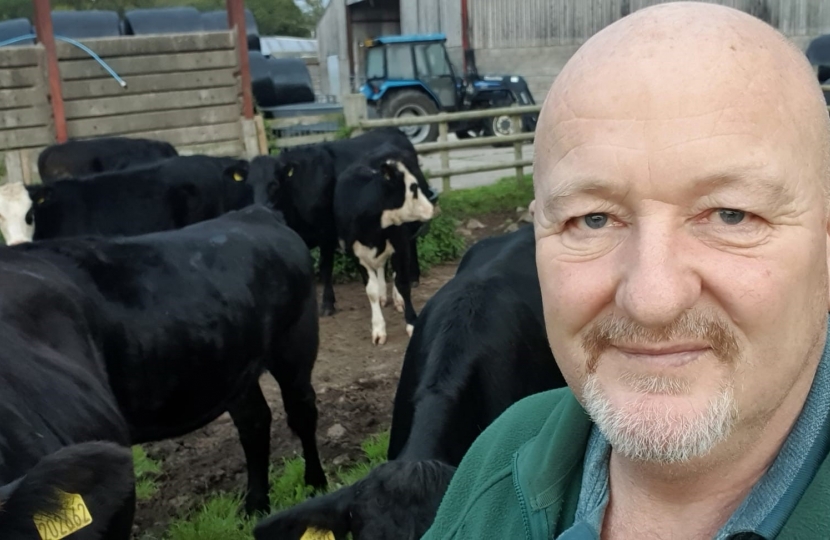
Peter Fox, the Member of the Senedd for Monmouth and Shadow Minister for Finance, has demanded urgent action to address the huge burdens facing the Grange Hospital.
This week, the Welsh Government Minister for Health, Eluned Morgan MS, gave reasons for why the Grange Hospital is facing huge problems, such as understaffed departments.
One reason Ms Morgan gave was “the local population are accessing the hospital in a different way from the way that was envisioned”.
But Mr Fox said residents should not be blamed for the current situation at the Grange Hospital.
He said:
“Firstly, I acknowledge that the Grange Hospital opened at an incredibly difficult time, mainly to help mitigate the increasing pressures of COVID. For this, we are all incredibly indebted to the work of our talented healthcare staff.
“But now the hospital is being used in many ways, and not just as it was originally envisioned as a critical care unit.
“It’s clear that the current situation, where the hospital has the worst A&E performance in Wales as well as staff shortages, is unsustainable. It’s vital that the Aneurin Bevan University Health Board continues to work in partnership with the Welsh Government to find a solution to these incredibly difficult problems.
“Solutions have to be found as it is totally unfair for the residents of our area to suffer as a result of the current situation. There needs to be a fundamental review of how the main hospitals in this region are currently working together and managing this hopefully short-term crisis.”
ENDS/
Editors notes:
See below for the exchange where Eluned Morgan MS argues that local residents have caused problems at the hospital.
Copy To Clipboard Share To Facebook Share To Twitter Share To LinkedIn Video
A flagship hospital, Minister, is of course supposed to be leading by example, and we know that the question today is about the Grange hospital, which has the worst A&E waiting times of any hospital in Wales. Now, the report in question today talks about the unhealthy workplace and talks about staff frightened to go to work. Understaffed departments, staff burnout and low capacity all of course add significant risk to patient safety. Doctors have told the Government of course the concerns that they have for patient safety regarding the Grange hospital being open four months early, as it would mean that the hospital would be understaffed. So, concerns have been expressed about capacity being too low for the demand that needs to be met across south-east Wales. Now, I'm conscious that the previous health Minister said that it would be a great pleasure to announce that the Grange will open ahead of schedule, saying that it would provide more capacity and resilience. So, my question, Minister, is: what's your assessment? Is the Grange providing that resilience? I suppose, ultimately, in regard to the report today, can you tell the Chamber what lessons in particular you've learnt as a result of the report's findings?289
Copy To Clipboard Share To Facebook Share To Twitter Share To LinkedIn Video
Thanks very much, Russell. We do hope that the Grange will become a flagship hospital, because we've spent a considerable amount of money on it; £358 million has been invested in this hospital to support the people of the Gwent area, and I do think that it's important that we remember the context in which it was opened. You must remember that, at the beginning of the pandemic, Gwent was one of the first places in the whole of the United Kingdom that was hit hardest by COVID, so having this hospital being able to take a bit of pressure off other hospitals in the area was a relief at the time. But of course, what it meant was that the recruitment that perhaps should have been done was not done in time. But you do, I think, need to remember the context in which we are working. I'm really pleased now, though, that the health board has understood that they do need to listen to the clinicians who have made their case very clearly through this report.290
The Grange was initially designed as a specialist centre, and provision for general internal medicine wasn't prioritised, but it's clear that the local population are accessing the hospital in a different way from the way that was envisaged, and I think the plan now is to make sure that any new recruitment will for example help to establish a front door based frailty service, for example, which will be able to be led by a consultant and other senior therapists, which is a provision that wasn't envisaged, but sometimes you do need to respond to, actually, the way that the local population are using the facility, even if that wasn't the way that was envisaged in the first place. I know that the health board has done a huge amount of work to try and contact the local population, to try and point them in the right directions in terms of which hospitals they should be attending for what issues. We're still going through those teething problems. It's just that those teething problems, of course in the middle of a pandemic, have taken longer than they would have, probably, if we weren't in a pandemic.

